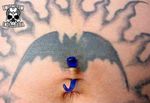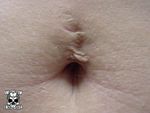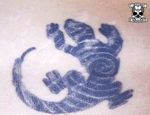Pregnancy
Pregnancy (latin graviditas) is the carrying of one or more offspring, known as a fetus or embryo, inside the uterus of a female human. In a pregnancy, there can be multiple gestations, as in the case of twins or triplets. Human pregnancy is the most studied of all mammalian pregnancies. Obstetrics is the medical field that studies and treats pregnant patients.
Childbirth usually occurs about 38 weeks from fertilization, i.e., approximately 40 weeks from the start of the last menstruation.
Getting mods while pregnant
Unless pregnancy is taking a heavy toll on you or you are particularly sensitive to shock, your body should still be able to receive and heal tattoos and piercings, although you may experience an extended healing time due to your immune system being somewhat depressed during pregnancy. Note that most professional piercers and tattooists will refuse to work on pregnant women, and will have documented disclaimers the person receiving the modification must sign. Another point to consider is that any infections acquired while healing a new mod will be more difficult to heal as well, and many antibiotics cannot be safely used during pregnancy. The Association of Professional Piercer's stance on getting pierced during pregnancy is: "It is advisable to refrain from undergoing any and all body art procedures during a pregnancy, even just an ear lobe stretch. It is best to let your body focus on the important, complex and demanding task that it is handling already." The APP also suggests that a three month waiting period be observed postpartum (after childbirth) in order for the body to normalize and regain physiological and hormonal equilibrium before piercing. Depending on your state of health, you may decide it's prudent to wait until after the child's birth so you can devote your body's resources to growing and protecting the baby. Also, remember, to some extent, anything you experience, your baby experiences as long as your bodies are connected.
Play piercing and ritual while pregnant
Pregnant women are plenty tough. If they're feeling up to it, there's no reason why they can't play if they want to. That said, pushing yourself past your limits would be a very bad idea, so only play with an experienced partner that knows you well. However, again note that your fetus will chemically feel what you're feeling, so if you put yourself into an altered state, it will affect your baby... although any permanent effects are unknown.
The effects of pregnancy on tattoos and piercings
Some women's mods are totally unaffected by pregnancy, but others experience more destructive effects. As far as piercing, some women remove their nipple piercings due to discomfort experienced as the breasts react to hormonal changes and the piercings become irritated, although removal of the piercings generally isn't absolutely necessary. Genital piercings may be removed in early labour in preparation for birth (whether decided independently by the mother, or required by the delivering medical professional), and it is often a good idea to do so, as the soft tissue will stretch considerably during childbirth and the piercings could potentially tear if jewelry is left in to resist the stretching. Navel piercings are generally the only piercings affected. Most women find that their navel piercing will migrate somewhat as their uterus grows and puts pressure on the jewelry, and that they may have to remove it towards the end of their second trimester or so. A small percentage have their navel piercing reject completely. Soft plastic "maternity" jewelry may be worn to retain the piercing, but many women find that if their piercing is very well-healed, jewelry can be removed completely and replaced postnatally with few or no problems at all - if the piercing shrinks somewhat, it can easily be tapered back open by a capable piercer.
 Large gauge navel straining at 40 weeks pregnant
Large gauge navel straining at 40 weeks pregnant
Tattoos on the belly that stretch out will mostly return to their original shape afterwards, but depending on your skin they may "blur" a little. If you get a lot of stretch marks from the pregnancy, those will damage the tattoo, but the good news is that you can always touch the tattoo up again afterwards which will help to both fix the damage and hide the stretch marks — they are totally safe to tattoo over, assuming they're healed. Note that stretch-marks, as with all scar tissue, will differ from the original tissue, including ink absorption properties. Touch-up and cover-up designs without a lot of straight lines are more likely to blend in and disguise any stretch-marks.




